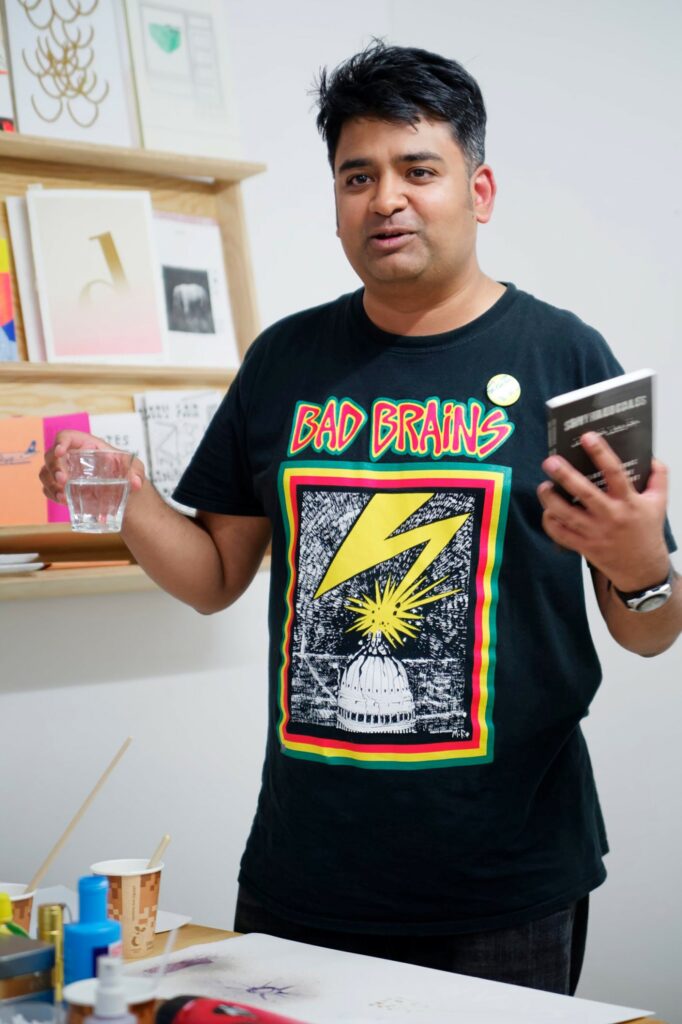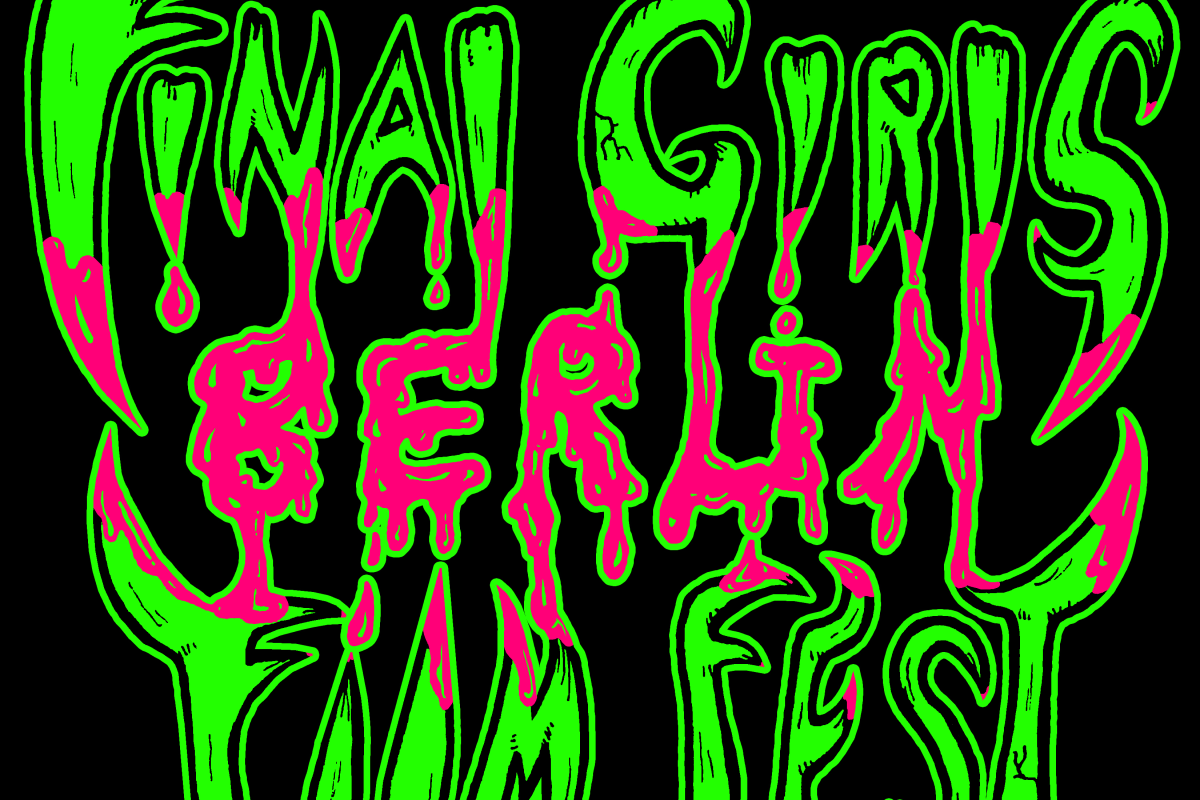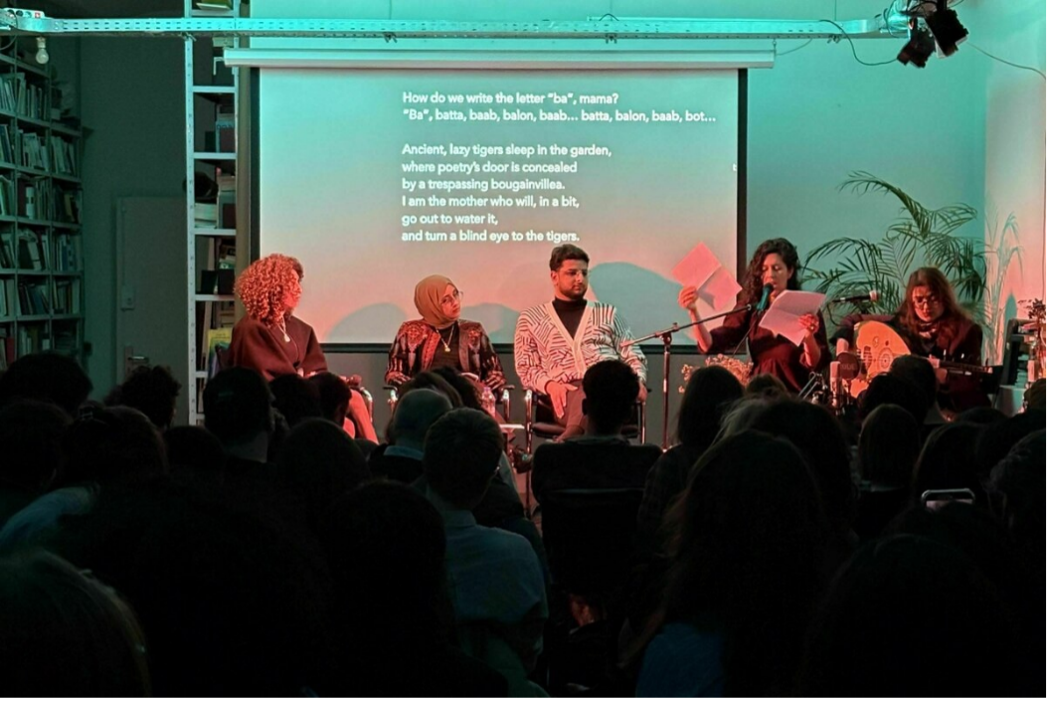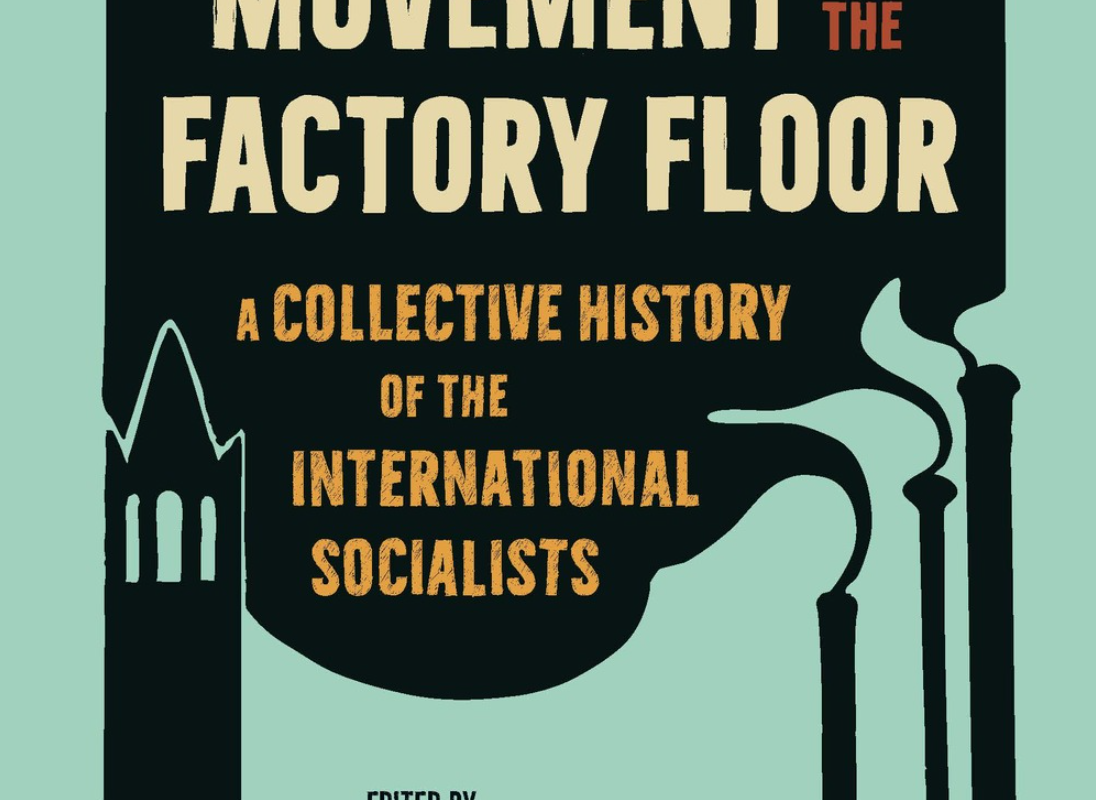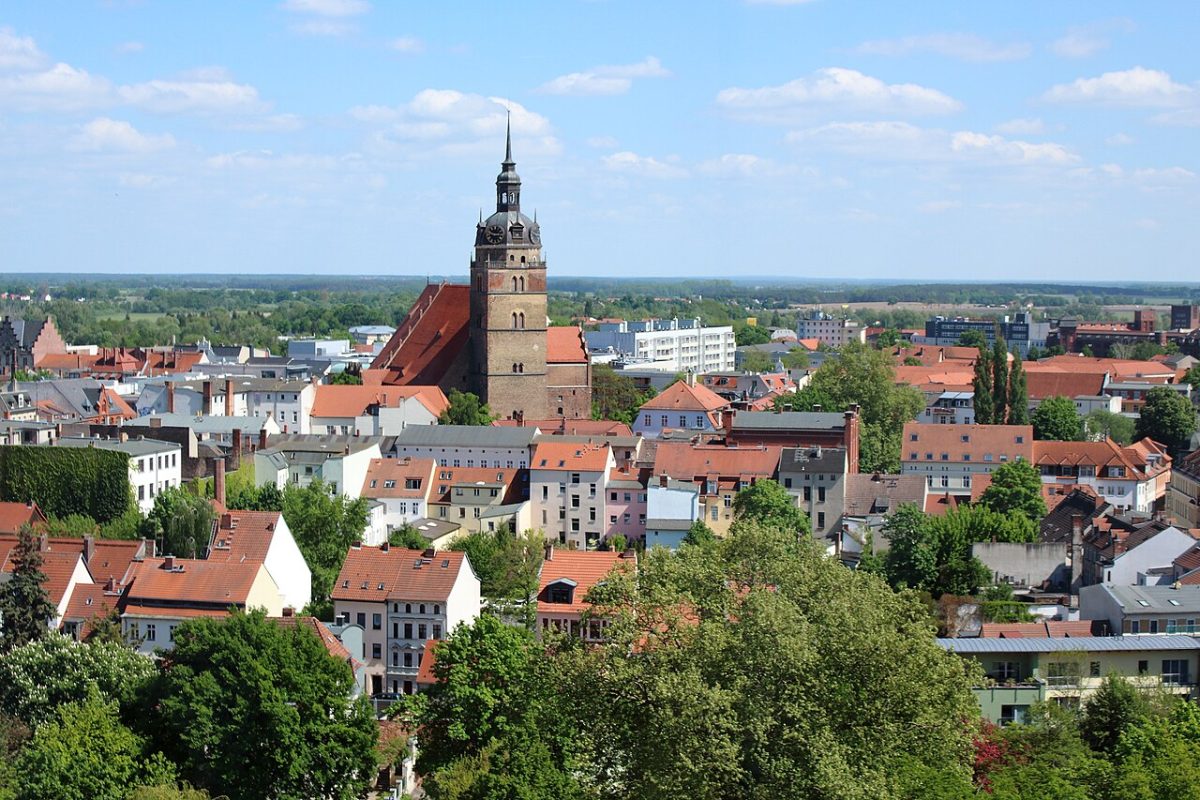Hi Hamja, thanks for talking to us. Could you start by saying who you are and what you’re doing in Berlin?
My name is Hamja Ahsan. I’m an artist who was born and raised in London. I was selected by the Documenta15 exhibition as one of the few solo artists coming from Britain. I made a new series of works about Halal fried chicken chains, which are ubiquitous in London. I’m now in Berlin to research Halal fried chicken, and more broadly the place of Muslim diasporas within Berlin.
I’m also generally interested in fried chicken, and its relation to class and race. In London, fried chicken means working class black and brown people. It’s often used by politicians to gain credibility. So, when the Tory politician Rory Stewart was trying to become mayor of London, he got himself filmed eating fried chicken.
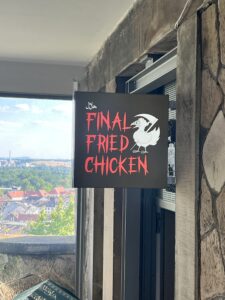
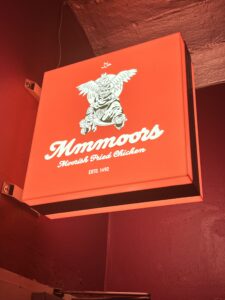
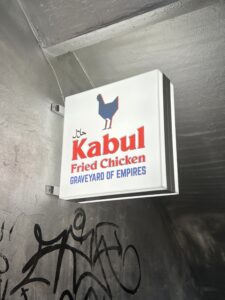
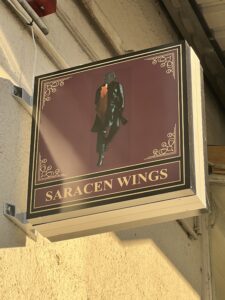
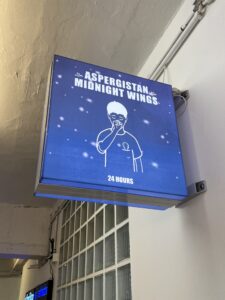
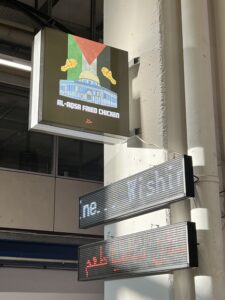
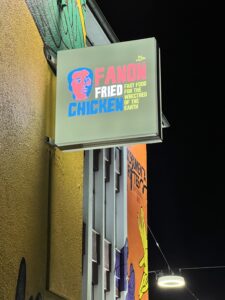
Pictures from Hamja’s exhibition (photos Ala Uddin)
How have you found Germany?
Being in Documenta15 has really awakened me to how bad racism, right wing politics and Nazi revivalism are here. I believed that Germany was a more civilized place than Britain, simply because a lot of white-art-world hipsters go and live in Berlin and Leipzig and say how life is so much better there.
I’ve now realised that if you’re Palestinian or Muslim or don’t belong to the Nazi blood family, Germany is actually quite a repressive place. I feel shocked about some of the things that have happened here, especially in relation to Documenta. The fact that the Chancellor interfered in the exhibition is astounding. I was speaking to some Turkish friends living here and they said Erdogan is authoritarian but would never interfere in the Istanbul biennial.
What I find weird about the German art world is how party politics is tied to it. The mayor of Kassel is an ex-cop from the SPD who twinned the city with an ethnically cleansed part of 1948 Palestine. He doesn’t know anything about art and even the staff members make fun of him. Yet he interferes with what artists can say.
I thought Germany was a place of artistic freedom and the opposite is true. It’s the only place I’ve been stalked, abused, and called a terrorist by members of the SPD. It’s the only place where a literal family member of Adolf Hitler’s cabinet – Beatrix von Storch from the AfD – rather richly described us as extremists. This is very shocking and frightening to me.
Documenta is like the Olympics or Mecca of art and should have been the best experience of my life. But it’s turned into the most terrifying, Kafkaesque, and Orwellian. The bureaucracy and the way no one takes responsibility is very deeply embedded in German society where many nice people with a bit of blond hair and blue eyes actually have a Nazi grandfather.
I’ve shown my art all around the world. I’ve spent a lot of time in the former Yugoslavia, especially in Slovenia. I’ve been to Trump’s America a few times. But I feel like my civil and constitutional freedom is better protected in these places than Germany.
In the US, I can go to an Ivy league university and openly speak about Palestine. Whereas when I came home from Documenta, I was abused and harassed nearly every single day. People called me a terrorist, and that’s never happened before. I was never even a big Palestine activist. It wasn’t that high on my cause list.
The media around Documenta seems totally divorced from any form of reality. The exhibition is extremely diverse – it’s fantastic. Everyone should go and visit it. It shows everything from childcare to neurodiversity and ecology. And a small part of it is concerned with the politics of the MENA region.
I was very shocked to listen to the parliamentary debate, which seemed almost deranged. The AfD were saying in parliament that they don’t like Documenta because it’s got too many Muslims. I was shocked that this is what people say in Parliament. I was also shocked about just how big the AfD are.
Germany’s got a good soft image abroad. But while everyone knows of George Floyd, everyone knows of the Christchurch massacre, no one in the Anglophone world knows about the NSU murders or Hanau. No-one knows about the assassination of the CDU politician Walter Lübcke.
What’s most disturbing is the complicity of the state and the media. I didn’t know what the Axel Springer press was – but it’s not just the Springer press: DW, the German equivalent of the BBC, also has a history of bullying their Arab Muslim brown staff.
Recently, DW sacked 7 Palestinian journalists, who are successfully challenging the sacking in court.
Yes, so it isn’t just the far right. I learned about the Anti-Deutsche and how they had infiltrated the staff network of Documenta. Some of them had been spying on me for things I’d said three years ago, and news stories from the Arab news media that I’d shared.
In Germany, I get accused of being in the Taliban, which is a Sunni organisation, as well as being part of a Marxist guerrilla group, the PFLP [Popular Front for the Liberation of Palestine], which is secular and atheist, and of supporting the Shia militia and Hezbollah in Lebanon and Iraq. I’ve not visited any of these countries. I’ve only been to Bangladesh.
There’s a think tank in Vienna called MENA Watch, which has an interview with this guy from the Alliance Against Antisemitism in Kassel. The alliance seems to be one lonely obsessive guy with a blog and 13 Twitter followers. He’s listed the names of artists who are pro-Palestinian, who he sees as antisemitic. The German media take this lonely, weird guy as some sort of authority although he has no journalistic or academic integrity.
The German media have produced a picture that has nothing to do with reality. You go to Documenta expecting to see 1930s Germany, a second Holocaust, and all these very weird things. But the exhibition is actually getting tens of thousands of visitors a day. It’s a very joyous occasion.
The AfD have tried to derail and shut down Documenta. They didn’t like Documenta14 last time because it was too pro-refugee. They attacked the Nigerian artist Olu Oguibe and his monument for refugees, which contains a line from the Bible about welcoming strangers in four different languages.
Now they’ve come to attack Documenta again and to try to shut it down. But this time, everyone seems to have been fooled and the AfD have recruited pro-Israelis. It was strange to see the grandchild of Hitler’s finance minister calling us extremists.
She’s against abortion and same-sex relationships. For a white European, that’s incredibly archaic. She’s so extremist that she describes Le Pen as too socialist or too left wing, which shows how deranged and extreme she is.
Then she visits our exhibition and posts about it – mainly about Black Lives Matter – and describes that as extremism. To me, that’s more about her and the state of Germany. The fact that she can just walk in there and no one bats an eyelid is disturbing and shows the complicity of Germany, and the indifference and lack of partisanship towards actual, real Nazis and fascists.
For people who haven’t been following the Documenta controversy, it started with works shown by the Indonesian collective ruangrupa.
It actually started much before then. There had already been several attempts to derail and disrupt Documenta. The AfD had nakedly said that there were too many Muslim names. I’m probably the most pious Muslim in the whole festival. ruangrupa are not devout Muslims. They sell their own gin and a beer brand at the festival. They might say salaam and stuff, but they’re not very Muslim.
What happened first was that an Islamophobic artist projected this thing called #Documenta1933 onto all the public buildings around Kassel. He put pictures of them as Nazis and homophobes. But there are many queer collectives in the exhibition from around the world, so that’s just nonsense. He’s just doing this because he’s prejudiced against people from Muslim countries. In fact, Beatrix von Storch is much more anti-queer. She’s friends with Bolsonaro, who is also vehemently anti-tolerance and diversity.
That was the first attempt, but it was a bit of a flop. While this guy has a lot of Twitter and Instagram followers, you discover that a lot of them must be fake because some of his posts were retweeted only twice.
There’s been a lot of stuff about West Papua and Indonesia in Taring Padi’s work, but the artwork contained the slogan “West Papuan Lives Matter”; they’re supporting the West Papuan movement. Except that this was demolished by the German police when they took down the so-called “antisemitism” mural.
After that, there were loads of attempts to derail Documenta, like tweets about Documenta being Hitler’s favourite exhibition. But these would only get one retweet or something. There were attempts to discredit the exhibition before it started.
The first major incident, I guess, was when the exhibition space WH22 was broken into and vandalized with neo-Nazi graffiti. The name of the Spanish neo-Nazi youth leader Peralta, who’s known for Islamophobic incitement against Arab migrants, was graffitied all around my exhibition space.
After the bombings of Gaza last year, there was a new wave of cultural awareness of BDS [Boycott, Divestment, Sanctions]. Suddenly a lot of cultural figures were so disgusted about the inhumane mass murder and destruction of civilian life, that even Premier League footballers like Sadio Mane would start waving Palestinian flags.
This created a new overground mainstream. Even Dua Lipa, the singer from London, was posting about Gaza. All the artists who were shortlisted for the Turner Prize made a collective statement saying they were appalled at the brutal attacks on Palestine. As a response, the Israeli embassy is attempting to push back against this mainstream cultural wave.
This made Documenta probably the most important battleground for anti-racism and solidarity towards oppressed people in the arts. We should not let this go. We should show the utmost solidarity, firstly for artistic and creative freedom, without interference by the SPD or German foreign policy. It is also our civil and constitutional right to show solidarity with people who have been dehumanized and brutalized.
What was remarkable about the discussion around Documenta is how it quickly moved away from a discussion about the Indonesian works, where arguably a couple of them were potentially problematic. But within a couple of days, it wasn’t about them at all. It was about BDS and artists who support Palestine.
It started with BDS, but it didn’t get very far. There was quite an orchestrated media operation where they took two little details from a 20-year-old painting about the Indonesian genocide of left-wing people in the world’s largest Muslim country, which was under the Suharto dictatorship.
Taring Padi was a collective formed after that dictatorship. They created a ginormous mural, which looks a bit like a Hieronymus Bosch or Where’s Wally? Painting. And in this Where’s Wally? painting, they picked out two figures. One was a figure of a Mossad agent as a pig. This was alongside other intelligence agencies, such as MI5, the CIA, who were all portrayed as animals.
The pig in their work is the same as that used by the Black Panther artist Emory Douglas depicting police. It’s about imperialists and capitalists. These are people who they say they care about class politics and class struggle, not race.
So, it wasn’t antisemitic whatsoever. In fact, both West Germany and Britain were complicit in this genocide and much worse. The West was complicit in the mass murder of between half a million and a million Leftists, and never paid reparations. Germany has never said sorry.
The other little figure is a caricature of an SS soldier. But then, the SS were also complicit in that genocide. I think of artists like Harold Offeh and Kara Walker who also have what you’d call racist caricatures, but it is within the context of their work. It has layers of irony. There’s no hatred.
If you look at Taring Padi’s work, they always propagate multi-faith alliances. They always use the Jewish, Christian, and Muslim symbols together. It’s very clear from their work that they’re an anti-Nazi party. The way they’ve been portrayed in the media as if they’re Nazi propagandists is a total falsehood.
Beyond that, they were actually naive. As a British person, I’d gone through two general election campaigns with Jeremy Corbyn, so I know the playbook. It felt like Taring Padi was Jeremy Corbyn. Like Corbyn, they tried to appease their critics.
What this did was to open the floodgate towards persecution and oppression of the other artists, including me. So, the next day I would get a message saying you are next on our list with a picture of a dog. I got very threatening messages from Germany.
The next big media scare was around an Algerian women’s collective of scholars who had a digital archive of illustrations about children being abused by Israeli occupation soldiers. They also included an image by Naji al-Ali, the Palestinian artist who created Handala. There’s now an attempt to withdraw that from the exhibition.
The artists from Documenta have these very big zoom meetings which stand for artistic freedom, solidarity with the oppressed, a lot of them are Global South artists. They’ve been through colonialism, occupation, imperialism, Fascist coup governments, etc.
I am clearly against antisemitism. I think every arts institution should adopt the Jerusalem declaration on antisemitism. But it seems to me is that they’re not even talking about antisemitism. What they’re talking about is allegiance and loyalty to German foreign policy.
And the idea that our artists, whom you’ve invited as a guest, should have to be in line with your foreign policy, seems to be a very fascist way of doing art. It’s a level of executive control that I’ve never encountered before anywhere I’ve been.
The narrative in the German press was first, “Look, here’s a postcolonial exhibition. We are letting people from the Global South exhibit”. The minute that the people from the Global South started saying things which weren’t according to the set rules, the press began attacking the artists.
Germany takes a lot of pride in Documenta, but actually, when you look deep into the history, the first few Documentas were curated by literal Nazis. And then Documenta10, which was curated by a French woman, Catherine David, created a bit of a controversy. Even the obsessive guy who runs the antisemitism blog in Kassel says she’s antisemitic.
But after Documenta11 in 2002, the game changed. Black and brown people were allowed more of a centre stage. And that inspired me. I dreamed of being in Documenta since then.
In the last 20 years, as Documenta has become more progressive, more internationalist, more black and brown faces in control, German society has becoming more regressive, right wing fascistic. Pegida started, the AfD became such a huge movement. There were all these Nazi mass murders. Today in Germany, far right violence is at a 20-year high.
So, it seemed German society was going one way and the art world was going another, which was going to create a fault line. And that’s what we’re seeing today.
Added to this, antisemitic incidents are rising, and the reaction of the political centre and part of the Left is to try to exclude any artist who is associated with BDS.
Yeah. I was very much wary of Germany because Kamila Shamsie, the British Pakistani novelist had an award taken away from her. My friend, the Palestinian artist Larissa Sansour, is very bleak about the state of Germany with attacks against Mohammed Al-Kurd and Achilles Mbembe, the brilliant black philosopher.
All of us see ourselves as being punished as part of this wider war against cultural workers who want solidarity with the oppressed.
How would you respond to someone in Germany saying, “Yes but BDS is the same as the Nazis saying, ‘Don’t buy from Jews?’”
Clearly that’s rubbish, and they should take a closer look. In Britain, every progressive person, whether liberal or left, supports BDS. Most trade unions support BDS.
Let’s look at house demolitions. A British company, Caterpillar, is used to bulldoze people’s houses. I don’t think that any human being alive would say that bulldozing somebody’s house is an acceptable way for a State to behave. This is why we boycott Caterpillar. There’s also the question of international law. Settlements are illegal. It’s modelled on the South African movement, which was effective.
Some of my best teachers are Israeli Jews. Tanya Reinhart wrote the first book I read about Israel/Palestine. There’s Gideon Levy. Even within Israel, there’s a movement called Boycott From Within. There are Israeli Jews living in Berlin who support BDS. When you see a house bulldozed, there’s people who think that is unacceptable, who are for BDS. And there are people who think it is acceptable, and they’re the anti-BDS.
I have this example in Documenta. I meet the staff and they’re very lovely young people interested in art. They come across as very nice. Then as soon as you say that Israel’s an apartheid state, they’ll suddenly be a bit tetchy and weird. They can’t swallow something that three human rights organisations – Amnesty International, B’Tselem, and Human Rights Watch – have affirmed. I find that white Germany just needs to be a bit more honest with itself.
The other horrible tendency is that while there is a horrible rise in antisemitic attacks, it is Nazis, Fascists and White Supremacists who are responsible, but Muslim minorities are scapegoated for this. Germany just needs to look in the mirror.
What happens next for Documenta and for you?
Everyone in Documenta has a guillotine hanging over their heads. Many are traumatized, many are depressed. It’s a mental health crisis. When I came back home, I couldn’t function; I didn’t know what had been written about me in the press. People were stalking me and slandering me. There was neo-Nazi graffiti.
It was crazy. Some of my work still isn’t properly installed yet. They derailed and disrupted their proudest cultural export to maintain an alliance with an illegal occupation by an Apartheid regime. I still don’t know what’s going to be said about me next week. Each day, a new shocking and disturbing thing happens.
Some of us have been physically attacked. Women in Algeria who are the most brilliant African female scholars are being witch-hunted, abused, and slandered. People think of Germany as such a welcoming place, and I’m finding the opposite. But I’m not going to let the racists win. That’s why I’m back in Germany.
I can walk down the street in London with a Palestine T-shirt and everyone wants to high-five me. When I do that in Kassel, I hear that they say “Here comes the Documenta artist. Let’s burn them alive. Documenta should be for German artists.” This makes me glad that I don’t speak or understand German.
I really admire the resilience of the Arab diaspora within Berlin, and I hope that one day Germany and colonised people can work together for a decolonial future.
Hamja is on Instagram @shyradicals and Twitter @hamjaahsan.
Hamja Ahsan (photo: Florian Cramer)
